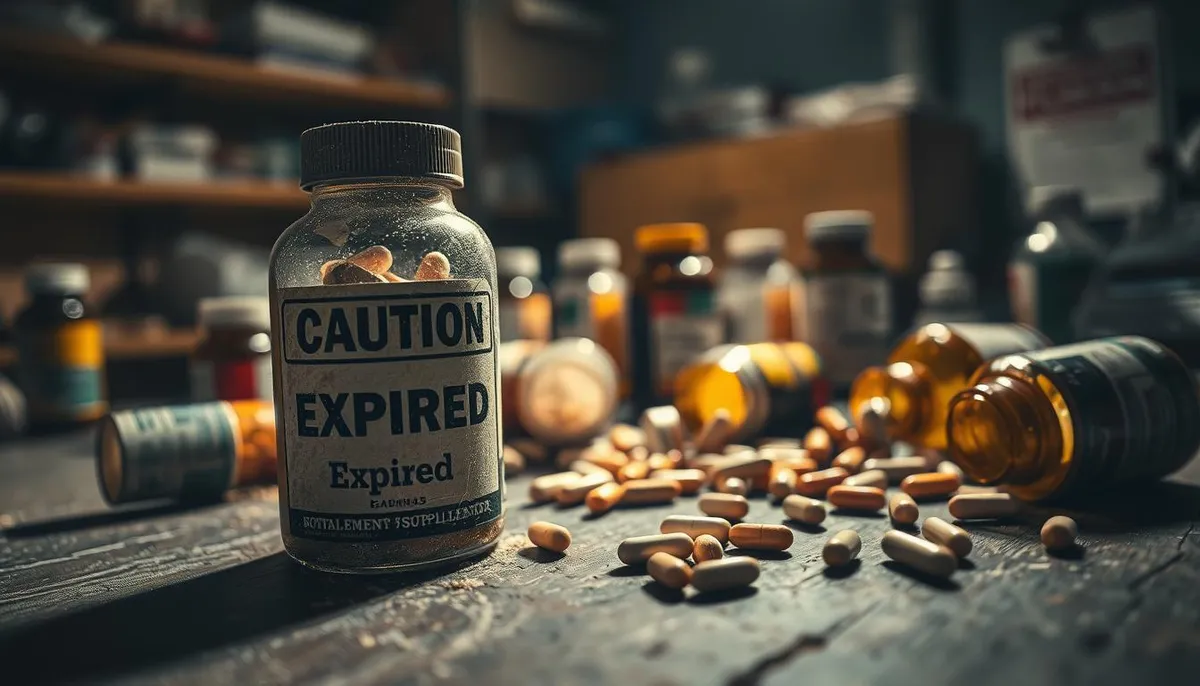Welcome to your complete guide on supplement effectiveness over time. Many people invest in vitamins and wellness products as part of their daily health routine. Understanding how these products maintain their potency is essential for getting the most value from your investment.
Unlike food that visibly spoils, vitamins and dietary aids don’t expire in the traditional sense. Instead, they gradually lose their strength as ingredients break down. This makes proper storage and timing crucial for maintaining their benefits.

According to research, the FDA doesn’t require manufacturers to include expiration dates on vitamin packaging. Senior research scientist Shilpa Raut from Amway indicates most vitamins have a typical shelf life of about two years. However, this varies based on the specific product type and storage conditions.
This comprehensive guide draws on scientific research and expert recommendations to provide trustworthy information. We’ll explore practical storage techniques and safety considerations to help you make informed decisions about your wellness routine.
At longevity-supplement.com, we’re committed to helping you maximize your life potential through premium products and cutting-edge health insights. Let’s dive into understanding how to preserve the effectiveness of your health investments.
Key Takeaways
- Vitamins don’t technically expire but gradually lose potency over time
- The FDA doesn’t require expiration dates on supplement packaging
- Most vitamins maintain effectiveness for approximately two years
- Proper storage conditions significantly impact supplement longevity
- Understanding potency decline helps maximize your health investment
- Different supplement types have varying shelf life characteristics
- Regular evaluation of your supplement collection ensures optimal benefits
Introduction to Supplement Shelf Life
The concept of shelf life for wellness products differs significantly from traditional food expiration dates. For nutritional products, shelf life refers to the period when they maintain their intended potency and deliver the labeled nutrient levels promised.
Overview of Vitamins and Supplements
Today’s market offers various forms of nutritional products, each with unique characteristics affecting longevity. Tablets, capsules, softgels, powders, liquids, chewables, and gummies all have different shelf life considerations.
Chewable vitamins and gummy supplements tend to absorb more moisture than tablet forms. This causes them to degrade faster. Tablets often retain their effectiveness for several years when stored correctly.
| Supplement Form | Typical Shelf Life | Key Characteristics |
|---|---|---|
| Tablets | 2-3 years | Most stable, moisture-resistant |
| Capsules | 1-2 years | Moderate stability, gelatin-based |
| Liquids | 1 year | Fastest degradation, refrigeration needed |
| Chewables/Gummies | 6-12 months | Moisture-sensitive, quick potency loss |
The Importance of Potency Over Time
Understanding potency over time is crucial because these products fill nutritional gaps in our diets. Reduced effectiveness means you may not receive the health benefits expected.
Potency loss occurs gradually rather than suddenly. Products don’t become completely ineffective overnight but slowly provide fewer nutrients than their labels indicate.
For people relying on specific nutritional support for deficiencies, maintaining adequate potency directly relates to health outcomes. Manufacturers conduct stability testing to determine appropriate shelf life estimates, ensuring quality throughout the product’s usable period.
Understanding the Science Behind Expiration Dates
Supplement expiration dates serve as a manufacturer’s promise about product potency rather than a safety warning. Unlike prescription medications that require expiration dates by FDA mandate, vitamin companies voluntarily include these markers.
What Expiration Dates Really Mean
The numbers on your vitamin label indicate when active ingredients may drop below labeled amounts. This differs from food expiration dates that signal safety concerns.
Manufacturers conduct stability testing to establish these conservative timelines. They store products under various conditions and test potency periodically.
Active ingredients break down through oxidation and environmental exposure. The degradation process happens gradually, not suddenly.

Differences Between “Best Before” and “Use By” Dates
These two terms convey distinct messages on supplement packaging. A “best before” date suggests optimal quality and potency.
A “use by” date indicates the final expected effectiveness period. Both dates are intentionally conservative with built-in safety margins.
Different manufacturers use varying testing protocols. This explains why similar products might show different expiration dates on their labels.
Understanding these distinctions helps you make informed decisions rather than automatically discarding products after the printed date.
Factors Impacting Supplement Potency and Shelf Life
Beyond the printed date on the bottle, several external factors significantly influence vitamin effectiveness. Time alone doesn’t determine when products lose their nutritional value. Environmental conditions and product design work together to preserve or diminish health benefits.
Environmental Influences: Heat, Light, and Moisture
Temperature dramatically affects vitamin stability. Heat accelerates chemical reactions that break down sensitive nutrients. Cool storage environments help maintain product quality.
Moisture poses another significant threat to supplement integrity. It can cause clumping in powders and dissolve protective coatings. This exposure reduces the stated potency of active ingredients.
Light exposure triggers photochemical reactions in certain vitamins. Vitamins A and D are particularly sensitive to ultraviolet rays. Dark storage locations protect against this degradation.
The Role of Packaging and Formulation
Product packaging serves as the first line of defense against environmental threats. High-quality containers with tight seals prevent air and moisture exposure. Dark glass bottles offer superior light protection compared to clear plastic.
Supplement formulation also impacts shelf life stability. Tablets with protective coatings outlast uncoated versions. Liquid forms generally have shorter effective periods than solid formulations.
| Packaging Type | Protection Level | Best For |
|---|---|---|
| Dark Glass Bottles | Excellent light barrier | Light-sensitive vitamins |
| Foil Blister Packs | Individual dose protection | Moisture-sensitive products |
| Plastic Containers | Good moisture resistance | General vitamin storage |
| Airtight Jars | Superior oxygen barrier | Powder formulations |
Manufacturers often include stabilizers and antioxidants to extend product shelf life. These additional ingredients help maintain potency throughout the expected usage period. Proper storage combined with quality packaging ensures maximum benefit from your health investment.
Optimal Storage Techniques for Vitamins and Supplements
The environment where you keep your vitamins plays a crucial role in preserving their nutritional value. Proper storage conditions help maintain product effectiveness throughout their usable life.
Best Practices for Maintaining Potency
Always store vitamins in their original containers. Manufacturers design these packages specifically to protect contents from environmental damage. This is the best way to ensure your products maintain their intended strength.
Find a cool, dry place for your supplement collection. Ideal locations include bedroom closets or dedicated pantry shelves. These areas offer consistent temperatures and low humidity levels.
| Storage Location | Protection Level | Recommended For |
|---|---|---|
| Bedroom Closet | Excellent | All vitamin types |
| Pantry Shelf | Good | Tablets and capsules |
| Refrigerator | Specialized | Fish oil, probiotics |
| Medicine Cabinet | Moderate | Short-term storage only |
Check the product label for specific instructions. Some items like fish oil and probiotics benefit from refrigeration. This way of storage extends their effectiveness significantly.
Common Storage Mistakes to Avoid
Avoid keeping your vitamins in the bathroom. The heat and moisture from showers create terrible conditions. The bathroom is one of the worst places to store vitamins.
Similarly, kitchen counters near appliances expose products to temperature fluctuations. Never transfer supplements to decorative containers. Original packaging provides the best protection for your health investments.
Expert Insights on How Long Do Supplements Last
Expert analysis reveals surprising findings about vitamin potency timelines. Research shows that most nutritional products maintain effectiveness well beyond conservative estimates.
Research and FDA Guidelines on Expiration
Military research discovered that 90% of medications remained effective 15 years past expiration dates. This suggests conservative dating provides significant safety margins.
The typical shelf life for vitamins is two years according to senior research scientist Shilpa Raut. However, this varies by product type and storage conditions.
Different nutritional products have distinct timelines. Multivitamins typically maintain potency for about two years. Vitamin C has a shorter window of one to two years.
| Supplement Type | Typical Shelf Life | Stability Factors |
|---|---|---|
| Multivitamins | 2 years | Moderate stability |
| Vitamin C | 1-2 years | Light and air sensitive |
| B Vitamins | 2 years | Heat and moisture sensitive |
| Fat-Soluble Vitamins | 2-3 years | More stable formulation |
| Minerals | Several years | Elemental stability |
The Food and Drug Administration doesn’t mandate expiration dates for dietary supplements. However, they regulate quality standards for manufacturers.
Third-party verification like USP certification ensures quality. Resources like longevity-supplement.com offer premium products with transparent standards.
Benefits and Risks of Using Expired Vitamins and Supplements
The question of whether expired vitamins pose health risks is common among health-conscious individuals. Many people feel uncertain about products past their expiration date.

Safety Considerations and Potential Side Effects
Taking expired vitamins is generally safe. Unlike spoiled food, these products don’t become toxic or poisonous. There are no documented cases of illness from expired vitamins.
The main concern is reduced effectiveness. Products gradually lose potency rather than becoming harmful. This matters most for people relying on supplements for specific nutritional needs.
For example, someone following a vegan diet needs consistent vitamin B12 intake. Taking expired supplements may deliver fewer nutrients than expected. This could lead to deficiencies over time.
Pregnancy represents a critical situation. Expired folic acid may not provide enough folate for fetal development. Proper nutrient levels help prevent certain birth defects.
Always inspect vitamins before use. Discard any with unusual odors, color changes, or moisture damage. While side effects can occur, they typically relate to ingredients rather than expiration.
Replacing expired products ensures you receive the intended health benefits. This approach maximizes your nutritional investment.
Conclusion
Your journey toward optimal wellness relies on understanding the true lifespan of your nutritional investments. While expired vitamins are generally safe, they progressively lose potency, making timely use essential for maximum benefit.
Proper storage in cool, dry locations extends your supplement’s effective life significantly. Regular checks of your collection ensure you’re receiving full nutritional value from fresh, high-quality products.
For those pursuing specific health goals, using potent supplements is particularly important. When questions arise, consult healthcare providers for personalized guidance.
Discover premium wellness strategies at longevity-supplement.com. Inspired by Blueprint Bryan Johnson’s innovative approach, this platform connects you to cutting-edge health insights and quality supplements designed to support a vibrant life.
Armed with knowledge about supplement longevity and storage, you can confidently optimize your routine for lasting health benefits. Start your journey toward a longer, healthier life today.
FAQ
Do vitamins and supplements actually expire?
Yes, they do. While they might not become unsafe like spoiled milk, they lose their potency over time. The active ingredients break down, making the product less effective. The expiration date is the manufacturer’s guarantee of full potency up to that point.
Is it safe to take expired vitamins?
Generally, it’s considered safe for most people to take vitamins past their expiration date. They typically don’t become toxic. However, the main risk is that they won’t provide the intended health benefit because the nutrients have degraded. If you have a sensitive system, it’s best to avoid them.
How long are supplements good for after the expiration date?
Most dietary supplements retain their quality for up to two years after the printed date if stored properly. The actual shelf life can vary greatly depending on the ingredients and storage conditions. It’s always best to follow the date on the label for guaranteed results.
What is the best way to store my vitamins to extend their shelf life?
Keep them in a cool, dry place away from direct light and moisture. The kitchen cabinet (away from the stove) or a bedroom drawer is much better than a steamy bathroom. Always keep the lid tightly sealed to protect the contents from air and humidity.
What environmental factors cause supplements to lose potency faster?
Heat, light, and moisture are the biggest enemies of supplement quality. High temperatures can accelerate the breakdown of ingredients. Humidity can cause clumping and degradation. Direct sunlight can also damage sensitive nutrients, reducing the product’s effectiveness.
Does the Food and Drug Administration (FDA) regulate supplement expiration dates?
The FDA requires manufacturers to have data to support their expiration dates, ensuring the product meets quality standards until that time. However, the agency does not set the dates itself. It’s the manufacturer’s responsibility to determine and label the shelf life based on stability testing.
RelatedRelated articles



